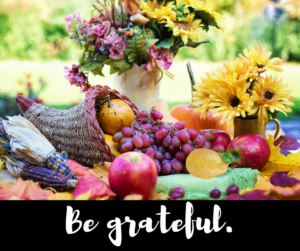
Gratitude is a something I’ve been thinking about the last couple months in an attempt to make it a more practical part of my daily life. While I wouldn’t say overall that I’m an ungrateful person, I found myself in the midst of a difficult season when it was challenging to not focus on the negative all the time.
All too often, I would find myself mulling over the negative things happening and noticed that I was just dwelling on the negativity way too much.
There’s a verse in the Bible that talks about taking every thought captive to Christ, and I started catching myself when I started down the negative thought trail. Instead of dwelling on why I was upset, I would choose to pray for the situation and people involved.
I also started focusing on gratitude when I first woke up and before I fell asleep at night. After the alarm would go off, I would lay there and think about the day and what I was grateful for going into a new day. At the end of each day, I would think over the day and what I had been grateful for.
These two habits—being careful what my mind focused on and pondering gratitude as the bookends to my day—began to change my outlook to a more positive one.
But I still wanted more.
I found a book that was specifically focused on gratitude and had a gratitude activity to do for 28 days. I decided to add this to my daily routine.
One component of it is to list ten things a day that you are grateful for. This is an activity that I’ve often done with the kids at different times, but certainly not every day for a month straight with as few repetitions as possible.
I thought that maybe I’d have trouble coming up with 300 different things to be grateful for over the course of the month, but many days I found myself having to choose only ten because I had way more to write about, and each day had different things to be grateful for, even if it was small.
The other part of listing 10 things to be grateful for was that for each thing you listed, you had to say why. “I’m grateful for ___________ because __________________.” Having to think about why you’re grateful for something forces you to really think about what it is that you’re grateful for. I think, in the end, it invokes deeper gratitude. It encourages you to really think deeply instead of just something basic like “I’m grateful for my husband because he’s a good guy.” Rather, I could say something like, “I’m grateful for my husband because he tended to the baby while she was crying so I could nap because I wasn’t feeling well and was really tired.”
Big difference, right?
I know it’s Thanksgiving this week, and we have a tendency to make November a month of gratitude, but I really would encourage you to make gratitude a daily habit year-round.
Remember, you make your habits, then your habits make you.
I want to be a grateful person. We have so much to be grateful for; we are truly blessed, even in the hard seasons of life.
I’ve created a PDF that’s a daily gratitude journal that you can download HERE.
It’s super simple—nothing special—and just meant to provide a basic template if you’re interested in integrating gratitude into your life in a more tangible way.
Sometimes we don’t feel like being grateful. There are hard seasons in life; I’m not minimizing that. I know there are those on the brink of loss, I know there are those mourning losses, I know there are those struggling with the one year anniversary of a loss; there are those in what we call “desert” or “wilderness” seasons in life, and there surely are those that are in a season of great joy.
I feel I’ve had more than my fair share of losses, but I will inevitably endure more over time. Deep loss signifies deep love. I would not know sorrow if I knew not joy. I have loved deeply, experienced great joy, and endured devastating loss.
For family movie night this past Friday, we watched The Arrival. I don’t want to give away any spoilers, but it ultimately asks the question: if you could know all that lies ahead, would you change it?
If you could know the future and undo the loss in your life, is it worth the joy that you would inevitably sacrifice?
Sorrow and joy are inexplicably connected; without one, you cannot know the other.
Is the joy worth the pain?
As difficult as the pain is, I still say yes. Our ultimate example of this, as believers, is Christ, who, ‘for the joy set before Him endured the cross’ (Hebrews 12).
Whatever befalls us in life, whatever season you are in, there is always gratitude, for the two are always connected.
Happy Thanksgiving my friends.
